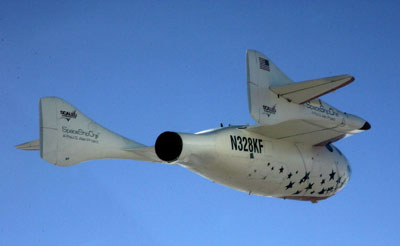Scenario planning for suborbitalby Sam Dinkin
|
| Operators that can only operate at high prices will fall victim to the alchemists’ paradox: the price of gold will fall to the price of lead. |
If there are millions of people willing to spend $10,000 to take a suborbital ride, then the market is not a national market. If there is $10 billion in nationwide demand, there will need to be many regional spaceports because travel time and expense will make up a substantial portion of the cost of the suborbital ride.
Liability concerns are likely to make each operation at each spaceport independent. The model will look more like a franchise model like Starmart’s than a national chain of corporate stores like Starbucks.
Rapid growth will lead to specialization as companies find that they can grow faster by outsourcing non-core business processes. The service providers are the biggest winners in boom time. Levi Strauss is a great story from the California Gold Rush. Many support services could become the next Levi’s. Travel agencies, space-camp trainers, regulatory support consultants, industry analysts, and space marketing services should all be viable.
The productivity gains from specialization can be tremendous. In Adam Smith’s pin shop in The Wealth of Nations, Smith estimates that a person working alone can make 1-20 pins per day while a team of ten separate specialists—one cutting the wire, another grinding it and so on—can make 48,000. That’s a gain from specialization of between 240 and 4,800 times as much productivity.
Right now, most of the suborbital entrants are not specializing. MSNBC quotes Jeff Greason, CEO of XCOR Aerospace:
Right now, more than 20 teams are all working on “the fun parts” of suborbital spaceflight, Greason said. But eventually, some of those teams will come up with solutions to the not-so-fun technical problems — and start selling those solutions to each other.
Without specializing, firms will be caught flat footed by the boom. They will struggle to meet demand and end up with a piece of the market that is too small to be viable.
The main challenges of Boom Town are keeping up with growth and minimizing unit costs.
Scenario 2: Dullsville
President George H.W. Bush is enlisted to take the first flight and he throws up in the pilot’s lap. There is a very low take-up rate. Mojave and Oklahoma are the only two spaceports still running after three years. There are only three operators in service with weekly flights. There is no specialization. Prices remain high due to low utilization with flights occurring once a week. Operators scramble to find science customers to fly a few extra flights. The media remains very interested given the amount of commerce, but the story fades. The operators struggle to raise revenue. The Department of Defense tries to help out with research contracts to keep the prospect of cheap suborbital and orbital alive.
| Without specializing, firms will be caught flat footed by the boom. They will struggle to meet demand and end up with a piece of the market that is too small to be viable. |
With low utilization and little to do between flights, operators have to be more versatile. Fewer participants means that there is less specialization. The market is national so franchising does not happen. Patient operators may find that the market grows over time. Extremely tight fiscal planning, patient accumulation of happy customers and operational improvements are the order of the day. CEOs have plenty of extra time on their hands to try to identify funding sources for orbital. Cost cutters that can eke out a profit with low revenue can survive to the next round.
The main challenges of Dullsville are keeping total costs low and scrambling for all revenue sources.
So which companies can manage both a steep ascent and an unpowered glide? The ones that use scenario planning may go from rags to riches overnight like Shell after the Yom Kippur War. Or perhaps companies that use scenario planning will get to the top of their game in thirty years. But whichever scenario ultimately occurs they will be ready, not shell shocked.
